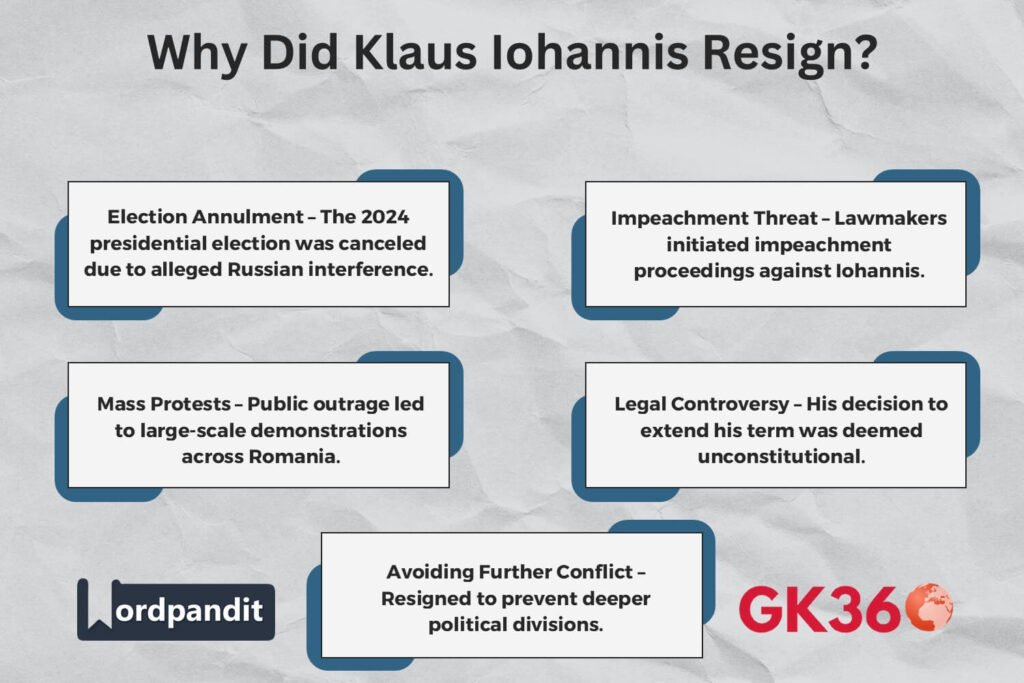Romania’s Political Crisis: Why Klaus Iohannis Resigned
Introduction
Romania’s political landscape has shifted dramatically following the resignation of President Klaus Iohannis. His departure came amid an impending impeachment vote and nationwide protests, sparked by the controversial annulment of the 2024 presidential election due to allegations of Russian interference. As Senate President Ilie Bolojan steps in as interim leader, Romania now faces a crucial election in May 2025 that will determine its political future.
This article examines the reasons behind Iohannis’s resignation, the implications for Romania’s democracy, and what lies ahead for the nation.

Table of Contents
- Why Did Klaus Iohannis Resign?
- Political & Social Impact of Iohannis’s Resignation
- Interim Leadership and Romania’s Political Future
- FAQs
- Conclusion: What’s Next for Romania?
Why Did Klaus Iohannis Resign?
Impeachment Proceedings and Legal Issues
The crisis originated from the annulment of Romania’s December 2024 presidential election. Intelligence agencies revealed that a network of nearly 800 TikTok accounts, allegedly linked to Russia, had influenced the election by boosting the far-right candidate, Calin Georgescu. As a result, the Constitutional Court canceled the election results, leaving Romania without a legally elected president.
In response, Iohannis extended his term, a move deemed unconstitutional by many legal experts and opposition leaders. The Romanian constitution permits presidential extensions only in extreme situations like war or natural disaster. Lawmakers initiated impeachment proceedings, arguing that his decision set a dangerous precedent and undermined democratic stability.
Public Protests and Political Pressure
Beyond the legal disputes, Iohannis faced massive public outrage. Tens of thousands of Romanians protested in Bucharest and other major cities, demanding his resignation. The opposition, led by liberal candidate Elena Lasconi, condemned his extended rule, accusing him of fueling political instability.
Avoiding a Divisive Impeachment Vote
Fearing further division, Iohannis opted to step down voluntarily, stating that his resignation was necessary to prevent deeper national turmoil. However, his departure does not guarantee stability, as Romania remains politically fragile with growing polarization.
Political & Social Impact of Iohannis’s Resignation
Strengthening of the Far-Right Movement
One of the most significant consequences of Iohannis’s resignation is the rise of the far-right. Calin Georgescu, who led the first round of voting in 2024, has gained momentum by capitalizing on public frustration. His nationalist and anti-establishment rhetoric, amplified by social media influence, has made him a formidable contender in the upcoming election.
If Georgescu wins in May 2025, Romania’s stance on EU policies and NATO alliances may shift, raising concerns among Western allies.
Protests and Clashes in the Streets
Following Iohannis’s departure, anti-government protests have continued, with demonstrators demanding electoral transparency. Clashes between protesters and law enforcement have erupted, reflecting the deep societal divide over the political crisis.
International Reactions and Concerns
Western leaders have expressed concern over Romania’s political stability. EU and NATO officials emphasized the importance of a fair and transparent election process to maintain democratic integrity. Given the previous allegations of foreign interference, Romania’s electoral commission is under immense pressure to ensure legitimacy in the upcoming vote.
Interim Leadership and Romania’s Political Future
Ilie Bolojan as Interim President
With Klaus Iohannis stepping down, Senate President Ilie Bolojan has assumed the role of interim president. His primary responsibility is to ensure a smooth transition and oversee the organization of the May 2025 elections. Bolojan has pledged to uphold democratic principles, but he faces significant challenges in unifying a divided nation.
May 2025 Presidential Election Candidates
The upcoming election will be a decisive moment for Romania’s future. The leading candidates are:
- 🇷🇴 Calin Georgescu (Far-Right Nationalist): His campaign focuses on national sovereignty, anti-EU rhetoric, and economic nationalism. His rise has been fueled by social media influence and widespread distrust in traditional political elites.
- 🇪🇺 Elena Lasconi (Liberal, Pro-EU Candidate): A vocal critic of Iohannis, Lasconi represents Romania’s pro-European faction. She advocates for democratic reforms, economic transparency, and stronger NATO alignment.
The outcome of the election will determine Romania’s stance on key international issues, including its relationship with the EU and NATO.
FAQs
1️⃣ Why did Klaus Iohannis extend his term?
Iohannis extended his presidency after the Constitutional Court annulled the 2024 election due to alleged foreign interference. However, his decision was widely criticized as unconstitutional.
2️⃣ Who is the interim president of Romania?
Senate President Ilie Bolojan has taken over as interim president until the new election in May 2025.
3️⃣ What impact will Iohannis’s resignation have on Romania’s future?
His resignation has deepened political instability and fueled the rise of far-right movements. The upcoming election will be crucial in determining Romania’s democratic trajectory.
4️⃣ How did foreign interference affect the 2024 election?
Intelligence reports revealed that a network of TikTok accounts, allegedly linked to Russia, had influenced voters in favor of far-right candidate Calin Georgescu. This led to the annulment of the election results.
5️⃣ What are the main concerns about the May 2025 election?
There are concerns over electoral transparency, potential foreign interference, and the growing influence of extremist political movements.
Conclusion: What’s Next for Romania?
Klaus Iohannis’s resignation marks a pivotal moment in Romania’s political history. While his departure may have prevented an immediate constitutional crisis, it has not resolved the deeper issues facing the nation.
With the rise of far-right nationalism, ongoing protests, and concerns about foreign interference, the May 2025 election will be a critical test for Romania’s democracy. Whether Romania embraces pro-European reforms or shifts toward nationalist policies will depend on the will of its voters in this decisive election.
Key Takeaways
| Aspect | Details |
|---|---|
| Reason for Resignation | Impeachment threat, election annulment, public protests |
| Legal Controversy | Extended his term despite constitutional limitations |
| Impact on Far-Right Politics | Calin Georgescu gains momentum due to public dissatisfaction |
| Interim Leadership | Senate President Ilie Bolojan takes over temporarily |
| Election Date | May 2025 presidential election will determine Romania’s future |
| Major Candidates | Far-right nationalist Calin Georgescu vs. pro-EU liberal Elena Lasconi |
| International Concerns | EU & NATO worry about Romania’s democratic stability and foreign interference risks |
Related Terms:
- Klaus Iohannis resignation
- Romania political crisis 2025
- Romanian election annulment
- Far-right rise in Romania
- Romania presidential election 2025
- Ilie Bolojan interim president
- Romania EU and NATO relations
- Russian interference in elections
- Romanian protests 2025
- Electoral transparency in Romania






